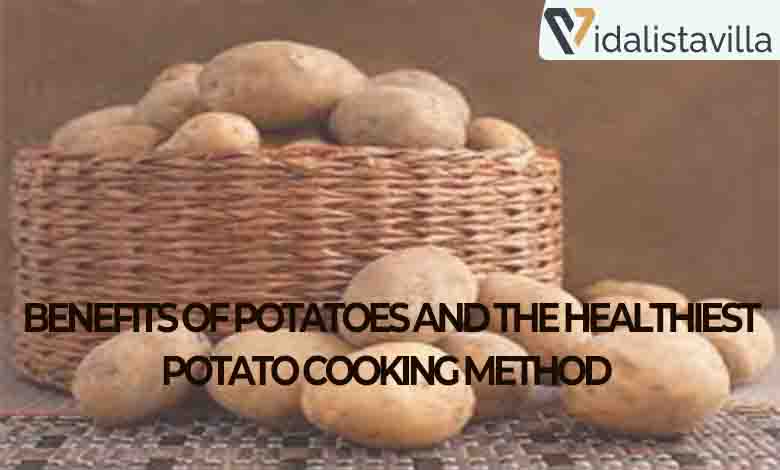Healthy potatoes are rich in vitamin C, potassium, fiber, B vitamins, and calcium. They are naturally gluten-free and low in sodium and fat.
When boiled, water-soluble nutrients such as vitamin C can leach into the cooking liquid. The best way to avoid this is to boil potatoes in a covered pot and leave the skins on.
1. High in Fiber
From mashed potatoes to scalloped cheesy potato casserole to fast-food fried potatoes, these versatile vegetables are a staple in many diets. But are they healthy? Although they may get a bad rap due to their starchy nature, potatoes are surprisingly good for you. They contain vitamin C, potassium, fiber, and B vitamins. The primary component of Vidalista 20 is tadalafil. They also help reduce inflammation and boost immunity. In addition, potatoes contain alpha lipoic acid, which helps promote brain health.
Potatoes are a good source of resistant starch, which acts as a prebiotic and provides fuel for the bacteria in your large intestine, helping to prevent and treat constipation and irritable bowel syndrome.
The high fiber content in potatoes is important for digestive health and bowel regularity. However, it’s important to note that a diet high in starchy foods like potatoes can increase your risk for gout.
2. Low in Calories
Potatoes, whether fried, baked, or mashed, are an excellent source of energy and contain fewer calories than other foods. They are gluten-free and rich in fiber, potassium, vitamin C, and vitamin B6. Potatoes have resistant starch which helps control appetite and suppresses short-term food intake, making them a good weight management option.
The dietary fiber in potatoes also helps to lower excess cholesterol levels in the blood. Vidalista 40 mg is made up of the ingredient tadalafil. It is an inhibitor of phosphodiesterase type 5, In addition, the potassium in potatoes is an essential nutrient for healthy blood pressure levels. Potatoes are also a good source of the amino acid L-tryptophan, which has natural sedative properties and may help ease stress and depression.
Other dietary components in potatoes, like zinc, phosphorus, and vitamin B6 have been shown to support brain health. Additionally, alpha lipoic acid, a coenzyme in potatoes, has been shown to aid in memory enhancement and reduce cognitive decline in Alzheimer’s patients.
3. High in Vitamin C
Potatoes are an excellent source of vitamin C. In fact, they contain more vitamin C than any other vegetable or fruit. Vitamin C helps the body absorb nonheme iron, strengthens immunity, and reduces inflammation. It is also important for healthy gums, skin, and teeth. A diet rich in vitamin C may help prevent scurvy, an illness characterized by fatigue or lassitude and widespread connective tissue weakness.
Besides vitamin C, potatoes are also high in potassium and vitamin B6. They are also a good source of folate, niacin, copper, and manganese. Potatoes contain a type of fiber called resistant starch, which improves blood sugar control and lowers cholesterol levels.
When choosing a potato, opt for a naturally colored one. They contain more antioxidants than white potatoes. And remember to eat the skin, as ounce for ounce, contains more nutrients than the flesh.
4. High in Potassium
Potatoes contain a lot of potassium. This mineral may prevent high blood pressure by helping your kidneys eliminate sodium. It also helps maintain normal blood levels of calcium, magnesium, and phosphorus. In fact, a medium-sized potato provides 544 mg of potassium and 27 mg of magnesium per 100 g cooked which represents 12% of the adequate intake for both nutrients for adults.
A diet rich in potassium may reduce the risk of high blood pressure and lower your risk for type 2 diabetes. It may also prevent triglycerides and lower cholesterol.
Potatoes also contain a significant amount of iron. This may help prevent low blood levels of iron in men and women. Iron is a crucial nutrient that allows your body to transport oxygen throughout the system. Your brain and nervous system depend on oxygen to function. Potassium has also been shown to improve mental health by increasing brain circulation.
5. Low in Cholesterol
While potatoes often get a bad rap for being high in fat and calories, when they’re prepared healthy, they can be a filling, nutritious food. When eaten with a variety of other vegetables and lean protein, they can help to balance your blood sugar levels and curb hunger.
They’re also naturally cholesterol-free and low in sodium. A dietary portfolio that contains potatoes, plus plenty of other whole fruits and vegetables, whole grains, margarine containing plant sterols or other plant-based fats; soy protein; leafy greens; and fiber-rich foods like beans and nuts, is effective in lowering LDL (bad) cholesterol and triglycerides.
The resistant starch found in acts as a prebiotic, which encourages the growth of healthy bacteria in the large intestine. This helps prevent constipation and irritable bowel syndrome. are also a source of Vitamin C, which is known to protect against free radical damage.
6. Low in Fat
Despite the bad rap they get for being high-carb, are actually low in fat. This means that they are a good source of a number of vitamins and minerals, including potassium, vitamin C, and magnesium.
In addition, the resistant starch found in potatoes helps control hunger and aids weight loss by increasing satiety and decreasing short-term food intake. Especially when paired with protein (like eggs), potatoes are also an excellent source of choline, which helps maintain healthy nerve cells and improves memory and learning ability.
Whether fried, baked, or mashed, potatoes are an important staple in diets across the world and can be prepared in many ways to suit individual tastes. However, they should be consumed in moderation to avoid excess calories, fat, and sodium. The most nutritious way to eat them is in the form of boiled or roasted potatoes with skin on them.





